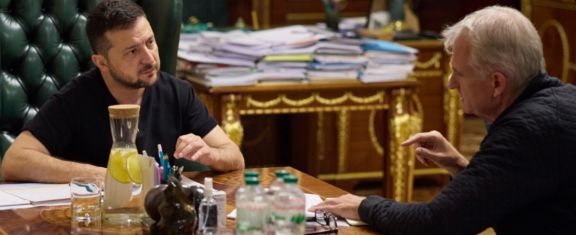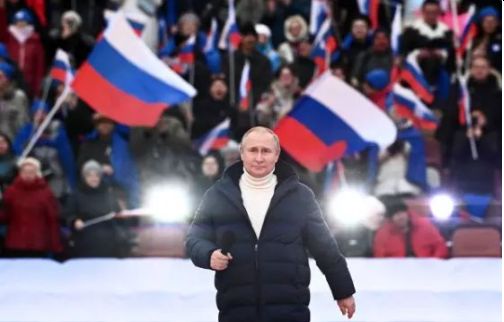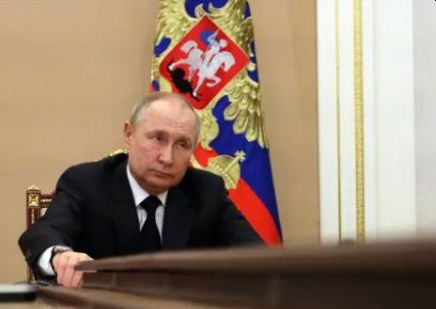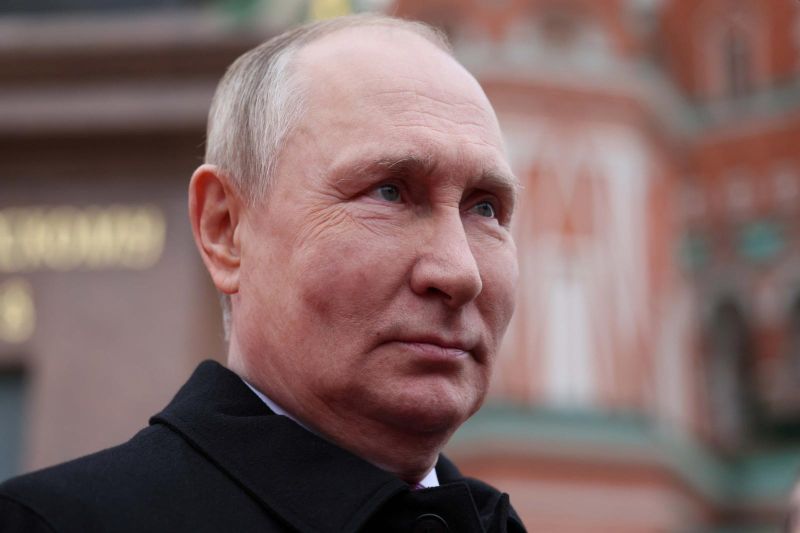By Eric Vandenbroeck
and co-workers
What To Do About Putin
Earlier
today, Timothy Snyder (author of "Bloodlands") wrote; My concerns
about the Russian invasion of Ukraine are the prevention of genocide and the
defense of democracy. But those who think first of U.S. interests should
acknowledge what Ukrainians are doing for American security. The least we can
do is be on our own side.

As the United States and its allies cope with the
current Putin regime and think about what might
eventually follow it, they would do well to remember the adage that Russia
is never as strong as it looks or as weak as it looks.
In turn, we
should ad that national leaders who are losing wars sometimes resort to
desperate gambles. Defeat or lack of victory might threaten their hold on
power, and they are sometimes willing to take daring or outside-the-box moves
to try to turn things around. This is the great fear about the war in Ukraine:
if Russian President Vladimir Putin judges that
his back is up against the wall, he may decide to take catastrophic action.

If he does so, he
certainly has some nasty tools he could use. In the weeks since Ukraine's
dramatic September offensive, Putin has already demonstrated his willingness to
order conventional air and missile strikes
against civilian targets, including population centers and power-grid
infrastructure in many parts of Ukraine. Russian forces could renew attacks on
the Zaporizhzhia nuclear plant, risking the release of nuclear radiation. More
darkly, one cannot rule out the possibility that he might deploy chemical or
biological weapons against Ukrainian targets, as his Soviet predecessors did in
their war in Afghanistan. Given the moral backlash ensuing, some might assume
that Moscow would be deterred from such action. But it is also possible that
Putin might be encouraged by the relatively lackluster U.S. responses to Syrian
dictator Bashar al-Assad's use of chemical weapons in the Syrian civil war and
Russia's use of a nerve agent against Russian defectors living in Britain in
2018.
Putin's repeated mention of nuclear weapons is even more
concerning to many observers. As a nuclear-armed state, Russia could
conceivably use a tactical nuclear bomb in an all-out effort to shift the war's
course. Although the reprisals for such an attack would likely be devastating,
observers may wonder if Putin could decide he has nothing to lose. On October
27, Putin declared, "There is no point in [using nuclear weapons], neither
political nor military," but his previous comments have been none too
reassuring. Will he stay away from the nuclear option even if he gets more
desperate?
The good news is that
history suggests that Putin is unlikely to fulfill the West's worst fears. Some
leaders in losing wars have taken dramatic actions to stave off defeat. But
often, they have decided against the most drastic options for political or
strategic reasons. Like other leaders before him, Putin will consider whether
his actions might help him win. He may be reluctant to contemplate moves that
could expose Russia to even greater losses or undermine his rule at home. Of
course, there are still reasons to worry about a desperate Putin. But by
examining how leaders tend to behave in these situations, the United States,
its partners, and allies can arrive at a more considered assessment of Putin's
threats and frame their policies accordingly.

Desperate, Not Foolhardy
The situation that
Putin now finds himself in is hardly new. Throughout the twentieth and
twenty-first centuries, many leaders fighting losing wars have somehow
attempted to snatch victory from the jaws of defeat. Occasionally, these risky
moves succeed, such as the United States' wild gamble during the Korean War to
undertake the Inchon amphibious landing, in which General Douglas MacArthur
launched a surprise after weeks of North Korean advances attack a fortified
site behind enemy lines, achieving a decisive victory. Often, however, these
moves fail: consider Germany's decision to begin unrestricted
submarine warfare in the Atlantic in January 1917, drawing the United
States into World War I and ensuring Germany's ultimate defeat.
Two things are clear
about these military gambles. First, they are usually built upon a theory of
victory. States will engage in such a move only if there is a logic by which it
might turn the war around. In ordering Germany's last-gasp offensive in the
Ardennes region of Belgium in December 1944, Adolf Hitler hoped to shatter the
American line and force U.S. President Franklin Roosevelt to consider peace
talks. Iraqi leader Saddam Hussein's SCUD missile attacks on Israeli cities
during the 1990–1991 Gulf War were intended to split Arab states from the UN
coalition. Neither of these leaders, of course, obtained their desired
objective, but in both cases, there was at least a larger plan in play.
Second, just because
a war is going badly does not mean everything is on the table. Despite being
backed into a corner, leaders may rule out some options. They may be wary of a
move that might incur outsized strategic costs, even if it might turn the tide
on the battlefield. In the Korean War, for example, China's November 1950
intervention posed grave risks to the U.S. military position there. Yet the
Truman administration ruled out direct attacks on Chinese territory because the
risks of escalation with the nuclear-armed Soviet Union were too high.
In other cases, a
leader may dismiss some options for fear of political backlash. Even a ruthless
autocrat may recognize the diplomatic costs of some military measures. This
does not mean that leaders stay away from all nasty behavior, but there are
some places they are unwilling to go, even in desperate times. Take nuclear
weapons. Since 1945, there have been several cases in which nuclear-armed
belligerents have lost or stalled conventional wars against non-nuclear
adversaries. Yet they have invariably elected to keep their nuclear weapons
holstered. The United States in Vietnam and Afghanistan, France in its
insurgency war in Algeria, China in its battles with Vietnam in the late 1970s
and 1980s, and the Soviet Union in Afghanistan in the 1980s: all failed to
accomplish their military goals with conventional means, yet none of them
resorted to nuclear weapons.
Moral considerations
sometimes constrain even heinous regimes. Consider Imperial Japan during World
War II, one of history's most genocidal regimes. In 1945, as defeat appeared
inevitable, the Japanese considered launching an extraordinary
biological weapons attack against California, dispersing fleas infected
with bubonic plague and other diseases from seaplanes. The operation was
eventually called off by the Japanese chief of general staff—partly, he said,
because though Japan had used biological weapons against China earlier in the
war, by using them against the United States, "Japan
will earn the derision of the world."
We also suggested
that the US dropping two atomic bombs was unnecessary
either."
Putin's Predicament
Given this general
pattern of restraint, what factors might shape Putin's thinking should Russian
military setbacks continue to pile up? The Russian leader's calculations are
framed because he has staked so much on the war. He fears the absence of
victory, meaning the lack of significant concessions by the Ukrainian government.
He has gone all in, describing the "special operation" as essential to protect Russia from NATO, neutralize the
"Nazi" threat posed by Ukraine, and for Russia to realize its true
Novorossiya identity and borders. And like most dictators, he has also made
concerted efforts to solidify his grip on power even as the war has unfolded.
Despite these steps,
the Russian war effort is floundering, and the Russian population has begun to
question the war. Some have publicly expressed outrage over the war's
mismanagement, including pro-Russian bloggers, the head of the defense
committee in Russia's lower house of parliament, local political leaders within
Russia, and members of the Russian media. Within Russian society, discontent seems to be growing, as shown by the
decision of nearly 300,000 Russian men to flee the country to evade the
recently expanded draft. Antiwar protests continue to occur, including from the
difficult-to-silence families of dead Russian soldiers, despite widespread
arrests and crackdowns. And the internet is flooded with stories of new
conscripts being sent into battle without proper training or equipment.
Putin in Red Square, Moscow, November 2022

As we suggested, the war, the logic goes, will sap public support for the Kremlin as
losses mount and sanctions destroy the Russian economy. if Russia
fails in Ukraine, it could pose a real threat to Putin's hold on power.
While a coup is unlikely, a meltdown of the
regime is more plausible, as multiple challenges overwhelm its capacity to
react and dysfunction drains confidence in Putin’s leadership. Another
possibility is in the mode of Nikita Khrushchev's ouster in 1964 or Mikhail Gorbachev in 1991. In this
situation, elites would privately approach Putin and tell him it is time for
him to go, without public protest or his arrest—although Putin's narcissism and
megalomania might cause him to view even this managed exit as unacceptable.
With the future of his power at stake, Putin might have added incentives to
pursue more significant pain and destruction in Ukraine. For example, as Russia
has done in recent weeks, by escalating civilian suffering, Putin may hope to
push Kyiv to make concessions. Nevertheless, a desperate Putin, much like his
counterparts in earlier losing wars, is unlikely to pursue the most drastic
options.
The darkest nightmare
of Ukraine and its Western allies is a Russian decision to launch nuclear
attacks. But consider the factors that Putin would need to weigh in making this
choice. First, it is crucial to note how completely out-of-bounds such a move
would be. Since 1945, states have engaged in an array of horrifying tactics,
using chemical and biological weapons, massacring civilians, and engaging in
mass sexual assault. Yet they have never used nuclear weapons. U.S. President
Joe Biden and his NATO allies have repeatedly stated that this is a bright-red
line that Moscow must not cross.
Putin's growing
isolation and hardening autocracy do not mean that he views using nuclear
weapons as acceptable. It is true that in recent years, Putin has taken large
steps to sever his ties with the West and has
loudly declared his indifference to Western disapproval of his tightening grip
on Russian society, his backing of the Assad government in Syria, his meddling
in Western elections, his invasion of Ukraine, and everything else. But nuclear
first use would be an action of a different order. It is the one thing that
might cause the entire world, including critical Russian allies such as Saudi
Arabia and China, to back away from Russia and withdraw support for Moscow.
There would likely be backlash within Russia, too, especially if Russian
nuclear first use occurred without direct NATO involvement in the war. One June
poll by the independent Levada Center in Moscow found that 38 percent of Russians
are "terrified" over Russia's possible use of nuclear weapons.
Disapproval aside,
using a nuclear weapon could open doors that Putin would prefer to leave
closed. NATO troops or airpower might become directly involved in Ukraine. And,
of course, there is the possibility that NATO could respond in kind, something
Russia does not want, especially given the United States' superior arsenal.
Furthermore, nuclear weapons are not particularly useful as tools of warfare in
that they are ill-suited for conquering territory. They would either destroy or
irradiate any assets that Russia hopes to conquer. And using nuclear weapons in
Ukraine, of course, runs the risk of causing radioactive fallout to Russia
itself. Notably, the 1986 nuclear plant accident in Chornobyl, Ukraine, which
released a far smaller amount of radiation than a nuclear weapon blast,
produced radioactive fallout that drifted over Russia and likely caused some of
the same health effects in the Russian population—such as increased rate of
thyroid cancer—that it did among Ukrainians.
Moreover, Ukraine
does not have obvious military targets for nuclear attacks, such as nuclear
weapons or aircraft carriers. The country's military strength is built on
thousands of brave fighters distributed across hundreds of thousands of square
kilometers of territory, often deployed close to Russian troops. Limited
nuclear attacks on Ukrainian forces would not heavily damage Ukrainian military
strength. Retired Russian generals have pointed out that nuclear weapons have little
utility, especially since conventional weapons can now accomplish many of
Russia's most significant military aims, such as damaging Ukrainian
infrastructure. In October, the Ukrainian government expressed concern that
Russia might destroy the gigantic Nova Kakhovka dam
in southern Ukraine, but with conventional explosives.
There is, of course,
the possibility that Putin could use nuclear weapons against Ukrainian
population centers to break the Ukrainian will to resist. Such attacks might
seem more strategic, even though history shows that bombing civilians rarely
cause the target country to make significant concessions. And using nuclear
weapons to kill a huge number of people rather than to achieve some military
objective would incur overwhelming global wrath.
Along with a nuclear
strike, the other desperate move the West fears most is a direct Russian
attack—even nonnuclear—on NATO member states. Given the current situation and
Biden's statements, it would be challenging for the United States to avoid
entering the war directly after such a Russian move. But this kind of attack is
even less likely than a nuclear attack because of its lack of strategic logic.
The Ukrainian military is already defeating Russian troops; the Kremlin must
fear the potential for humiliation at the hands of NATO forces.
The Strength Of Reason
Given these
significant barriers to drastic escalation on Putin's part, the West can afford
to turn down the panic meter a bit. Just as fears of Saddam's possible
desperate actions rightly did not dissuade us from liberating
Kuwait in 1991, concerns about Putin's desperation should not stop us from
supporting Ukraine. Western leaders should continue their current course of
action, which is to provide a steady supply of military aid to Ukraine, seek
ways to isolate Russia diplomatically and economically, and keep NATO troops
out of combat, knowing that this course allows Ukraine to fight, survive, and
make headway without creating significant risks that the West's worst fears
might come true. Just as the United States should be careful not to provoke or
provide a pretext for Russian escalation needlessly, there is also no need to
seek peace at any price.
That said, finding a
way out of the war and its escalating human costs has become increasingly
urgent. The conflict continues to inflict enormous suffering on the Ukrainian
people and economic damage on much of the world by disrupting the energy and
food markets. And Putin can and may resort to tactics that could worsen this
suffering and damage, even without pulling the nuclear trigger. Finding a way
out means having a real conversation about the peace terms. Especially given
Ukraine's military successes this fall, Ukrainian recognition of the Russian
annexation of Crimea, as recently suggested by Elon Musk, is likely off the
table. But in exchange for at least the Russian withdrawal of all troops from
Ukraine and a verbal commitment to no longer support rebel groups inside of the
country, Ukraine could agree to stay out of NATO, especially since Ukrainian
NATO membership is unlikely to get through the U.S. Senate. Even without a
membership, NATO could continue to supply Ukraine with training and weapons. Ukraine
could also agree to restore the water flow to Crimea, something it could do without
recognizing the Russian conquest of Ukraine.
One should not let
exaggerated fears of desperate action dissuade from advancing national
interests. The West's enemies sometimes wish to feign desperation or madness to
frighten it into inaction. Let us not accommodate them.
For updates click hompage here